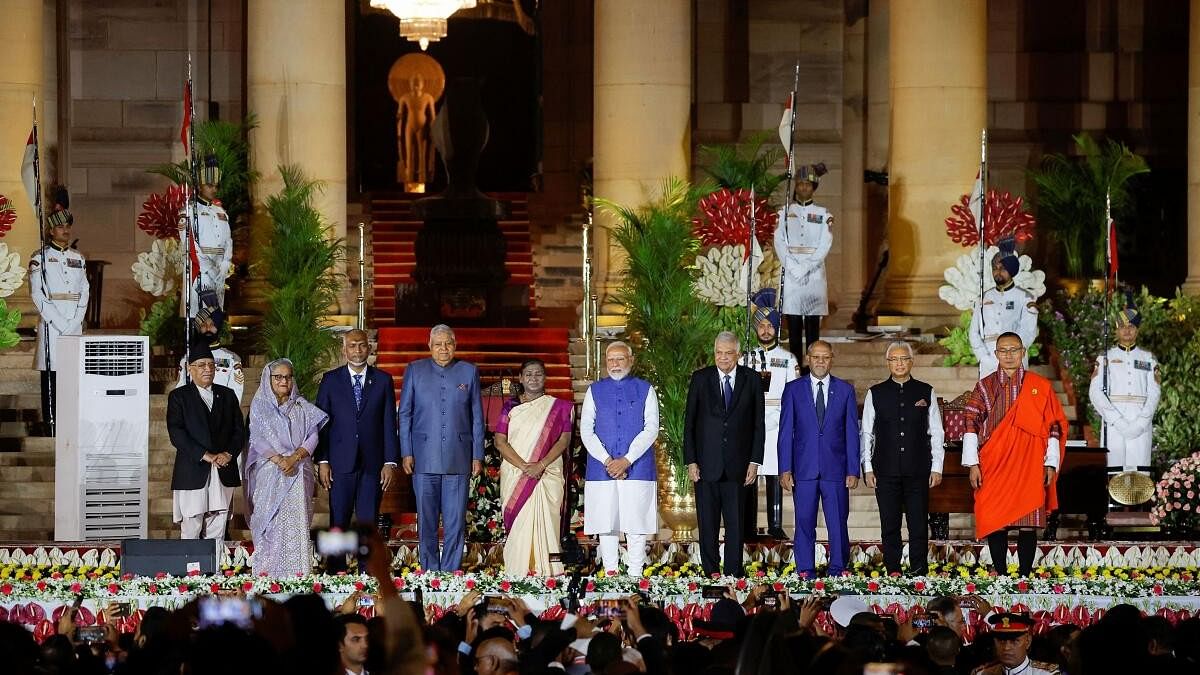
President Murmu with PM Modi, Sri Lanka's President Ranil Wickremesinghe, Maldives' President Mohamed Muizzu, Seychelles' Vice-President Ahmed Afif, Bangladesh's Prime Minister Sheikh Hasina, Mauritius' Prime Minister Pravind Kumar Jugnauth, Bhutan's Prime Minister Tshering Tobgay and Nepal's Prime Minister Pushpa Kamal Dahal.
Credit: Reuters Photo
Even as Beijing once again joined Islamabad to needle New Delhi on the issue of Kashmir, India on Sunday sent out a message to both China and Pakistan by rolling out the red carpets for the seven neighbourhood leaders, who attended the swearing-in ceremony of Prime Minister Narendra Modi.
A day after Chinese President Xi Jinping and Pakistani Prime Minister Shehbaz Sharif met in Beijing and opposed ‘unilateral actions’ to resolve disputes in South Asia, New Delhi had Prime Minister Sheikh Hasina of Bangladesh, President Ranil Wickremesinghe of Sri Lanka, Prime Minister Pushpa Kamal Dahal a.k.a. Prachanda, Prime Minister Tshering Tobgay of Sri Lanka, Prime Minister Pravind Jugnauth of Mauritius, and President Mohamed Muizzu of the Maldives witnessing the swearing-in ceremony at the Rashtrapati Bhawan. The ceremony marked the beginning of Modi’s third straight term as the prime minister of India.
Ahmed Afif, the vice president of Seychelles, represented President Wavel Ramkalawan of the Indian Ocean archipelago at the ceremony.
New Delhi had the leaders of seven of India’s neighbours in South Asia and the Indian Ocean region assembled at the Rashtrapati Bhavan just after a joint statement issued by China and Pakistan subtly hit out at India. “Both sides stressed the importance of maintaining peace and stability in South Asia, the necessity of resolving all outstanding disputes, and opposed any unilateral actions,” China and Pakistan stated in a joint statement in an obvious reference to India’s August 2019 move to strip its Jammu and Kashmir state of its special status and to reorganise it into two union territories. Sharif informed Xi of the latest developments in the Jammu and Kashmir region. Xi reiterated that the issue of Kashmir is “a dispute left over from history and should be properly resolved through peaceful means in accordance with the United Nations Charter, relevant UN Security Council resolutions, and relevant bilateral agreements”.
New Delhi maintains that the 1972 Shimla Agreement between India and Pakistan and the 1999 Lahore Declaration left no scope for the UN or any other third party to play any role in resolving the “outstanding issues” between the two neighbours.
The move to have the neighbouring nations present at the swearing-in ceremony of the National Democratic Alliance government in New Delhi on Sunday was significant in the context of India’s attempt to counter China’s bid to spread the tentacles of its geopolitical influence beyond Pakistan and Afghanistan to other countries in the neighbourhood of India.
The presence of Muizzu at the Rashtrapati Bhavan was particularly significant as he had been over the past few months leading the Maldives into the orbit of China’s geo-political influence triggering concerns in India. He had once led an ‘India Out’ campaign in the Maldives and won the presidential elections in September 2023 promising to make India withdraw all its military personnel – deployed for medical evacuations and other humanitarian services – in the Indian Ocean archipelago.
Muizzu, himself, stated before leaving Malé for New Delhi that his visit would demonstrate that the relations between the two nations were heading in a positive direction.
When Modi had taken the oath to commence his first term as the prime minister in May 2014, New Delhi had played host to the leaders of the SAARC (South Asian Association for Regional Cooperation) nations, including M Nawaz Sharif, the then prime minister of Pakistan. Modi had held separate bilateral meetings with all the SAARC leaders, including one with Sharif, which had raised hope for a thaw in bilateral relations. But after back-to-back terror attacks in India by outfits based in Pakistan, Modi had declined to attend the 19th SAARC summit that Sharif had planned to host in Islamabad in November 2016, leading to the cancellation of the conclave. The SAARC has remained in an impasse since then.
With New Delhi focussing on breathing fresh life into the BIMSTEC (Bay of Bengal Initiative for Multi-Sectoral Technical and Economic Cooperation) and projecting it as an alternative to the SAARC for regional cooperation sans spoilsport Pakistan, the leaders of the seven-nation bloc had been invited to attend the second ceremony when Modi had taken the oath for his second term in May 2019.
The leaders of Myanmar and Afghanistan had attended Modi’s swearing-in ceremony in 2014 and 2019. But, with Myanmar ruled by a military junta since February 2021 and Afghanistan under the Taliban since August 2021, New Delhi refrained from sending out invitations to Kabul and Nay Pyi Daw this time.
